In my peripheral, a dark figure slid across the kitchen counter. I turned my head to see a Lazarus lizard running for cover, obviously more startled than I was. Now I have no mercy for most intruders—flies, spiders, or those soft squishy house centipedes with dozens of hair-like legs that continue to move after they detach from their body—except to kill them quickly. But I automatically smile every time I see one of these lizards, even in the house. The last one that paid us a visit inspired CW to write a blog in which he includes the history of how they got here from Italy: Sheltering in Place With a Lizard.
Even though they make me happy, I prefer not to have them walk through our food or run around at night where I might step on them in the dark. So my mission was to get this little critter back outside where it belonged and where I knew it would be happier.

My visitor played hide-and-seek with me, darting among containers of food cooling for the freezer and a stack of books I’d brought down from the attic to clean up and give away. After a while, it shot to the end of the counter and hopped up on the power strip for a break.
I was sure it would skitter behind the shelves and I would never see it again, so I was relieved when it leaped back to the counter for more games. While I was digging out a container to catch it, I heard a plop. Turning back to the counter, I discovered it had run the other way and had dropped into the sink of sudsy water left from the lunch dishes.
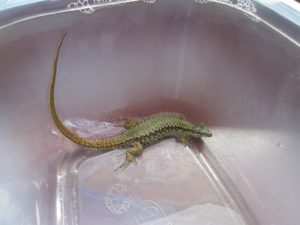
If lizards vocalized like cats or dogs, I’m sure I would have heard terrified squeals as it churned the foamy water, trying to climb the slick porcelain to safety. But it was eerily quiet. I felt like I was watching a silent scene in a disaster movie (Titanic fittingly comes to mind) in which people are desperately trying to escape their peril while haunting background music plays.
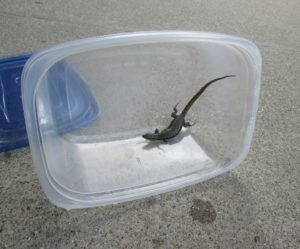
With the lizard’s choices limited to its demise or my help, it allowed me to scoop it from its turmoil. Then I was able to grab my camera. After the compulsory photo shoot, I carried the lizard out to the porch and set the container on its side.
The lizard clung to the bottom, now the side, as it recovered from soapy bubbles and near drowning. Finally it sniffed freedom and cautiously crawled out. As soon as its toes touched concrete, though, it sprinted for the brick pillar. After all, the Lazarus lizard is a subspecies of Podarcis muralis, the Common Wall Lizard. It easily found a crack to slither into, and its long slender tail jerkily disappeared.
I’m sure we all, at some time in our lives, have plopped into a deep sink of sudsy dishwater with no apparent way of escape. It may be a job that has become unbearable, an accident that lays us up for a while, a relationship that suddenly ends. We don’t know how we got there or why we are there, but we do know we don’t want to be there.
There are various reasons we may be in such circumstances, but I believe sometimes God engineers them to get our attention. We go about our lives doing our own thing and forget about God, or we might even knowingly ignore Him and run from Him like the lizard ran from me. He, on the other hand, is always aware of us and seeks a relationship with us.
Jeremiah 29:11 is one of my favorite verses: “For I know the plans I have for you,” declares the Lord, “plans to prosper you and not to harm you, plans to give you hope and a future.” These are comforting words to me. They were written to God’s chosen people, the Israelites. But believers today are God’s people, too, so I see the words applying to us as well. Our specific circumstances differ, but God’s words remain true.
The Israelites had just been carried into exile from Jerusalem in Judah to Babylon. We might say that Babylon was their “sink of dishwater.” We find out a lot about the Israelite’s situation in a letter that Jeremiah, called by God to be a prophet to Judah, wrote to the exiles (Jeremiah 29: 4-23). False prophets continually declared that God would soon rescue them, but it was a lie. In fact, God told them to settle in because they would be there for 70 years (v. 5-10).
Although Nebuchadnezzar, king of Babylon, carried off the Israelites, the first line of the letter states who actually landed them in the sink. “This is what the Lord Almighty, the God of Israel, says to all those I carried into exile from Jerusalem to Babylon” (Jeremiah 29:4). It was God who was in charge and had prepared the dishwater.
Because His people had forsaken Him to worship other gods and had ignored every call to repentance, God finally brought destruction on Jerusalem. However, His love did not allow Him to give up on them entirely, despite their continual rejection of Him. So He carried this remnant of His people into captivity.
They swam in that dishwater for 70 years. But God had made them a promise. “This is what the Lord says: ‘When seventy years are completed for Babylon, I will come to you and fulfill my gracious promise to bring you back to this place’ ” (v. 10). His plan was to return them to the homeland He had given them. It just wouldn’t be as soon as they wanted.
Our plans don’t always match His, either. We may want to play hide-and-seek in the kitchen when God wants us to scurry across sidewalks outside. But we can take comfort in knowing some things about His plans.
“I will prosper you and not harm you.”
His plans are “to prosper you and not to harm you” (v. 11). The Hebrew word translated “prosper” is shalom, which means “completeness, soundness, welfare, peace” (Strong’s Concordance). It is “peace with God, especially in covenant relation” (Brown-Driver-Briggs). “Harm” means bad or evil. It doesn’t mean things that happen in our lives won’t hurt us; suffering is part of the human condition. But God’s plan for us is completeness that comes only from a relationship with Him, and it is never to do anything evil to us.
“I will give you hope and a future.”
God’s plans are also “to give you hope and a future” (v. 11). The Hebrew word for “hope” is tiqvah, meaning a cord. It comes from qavah, “to wait for, literally, a cord (as an attachment); figuratively, expectancy . . . thing that I long for” (Strong’s). “Future” is the Hebrew word acharith and refers to time, the “latter part or actual close . . . i.e. a happy close of life” (Brown-Driver-Briggs). Our hope is like a cord that binds us to what we long for, all of which is found in a relationship with God. God’s plan is always to draw us to that end.
Let’s go back to where God wanted to return the Israelites to their homeland. The exiles wanted to go back too, but their desire was hugely different. They longed to go back to a place; God wanted them to come back to a person—to Him. “I remember the devotion of your youth, how as a bride you loved me and followed me through the desert, through a land not sown” (Jeremiah 2:2).
God’s plan for them—and for us—is to love Him and devotedly follow Him through all the unknowns in life. He created us to enjoy our relationship with Him. And to get us to that place, He will lovingly do whatever He knows it takes—even if it’s letting us run full speed off the counter to plunge into a sink of stifling sudsy dishwater.
[NOTE: Hebrew definitions and commentary notes are from Bible Hub. See Resources.]

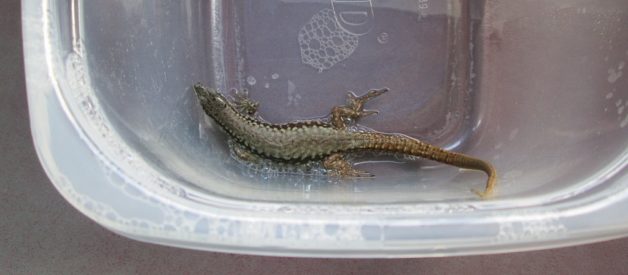
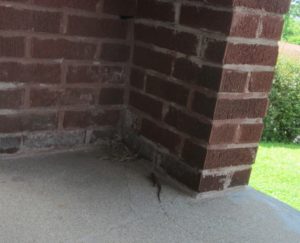
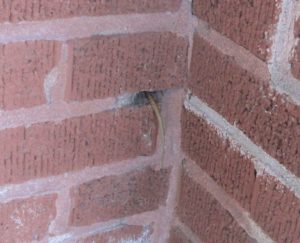


Brenda
October 12, 2020Like you I hate killing what I don’t have to (of the larger species anyway) and would rather get them outside, but I’m so squeamish it’s a race of who can run from the other the fastest. What a great illustration, though, of us and God. I’ve had my dishwater moments too, and God has lovingly reached down and lifted me out to safety. Thanks for the reminder!
bspencer
October 12, 2020Ha! I have this hilarious picture in my mind now of a variety of critters all chasing you through your house, Brenda.
I like that “dishwater moments.” They may seem like an eternity when we are in the midst of them, but in the big picture they are only a brief time. Especially if we are listening to what God is trying to say to us.
marilyn
October 13, 2020I just got around to reading your blog today and it just so happens that today Jeremiah 29 was part of my Bible study! I have been studying Jeremiah for a while, and he mostly warned of pending judgment until around chapter 29 and the verse you quoted. It gives me hope for America that once we go through our period of discipline that the Lord has something good in mind for our nation.
bspencer
October 14, 2020I share your hope for America, Marilyn. I get discouraged about our country, but God’s discipline means that He hasn’t abandoned us. There’s purpose in it—to turn His people back to Him.
Angie Camp
October 15, 2020Love your God-given gift of words, personal illustrations, and humor! HAPPY BIRTHDAY in a week!!! Angie
bspencer
October 15, 2020Thank you for your kind words, Angie.
And thank you for the birthday greeting. What a surprise that was, and a bright spot in my day that you remembered!